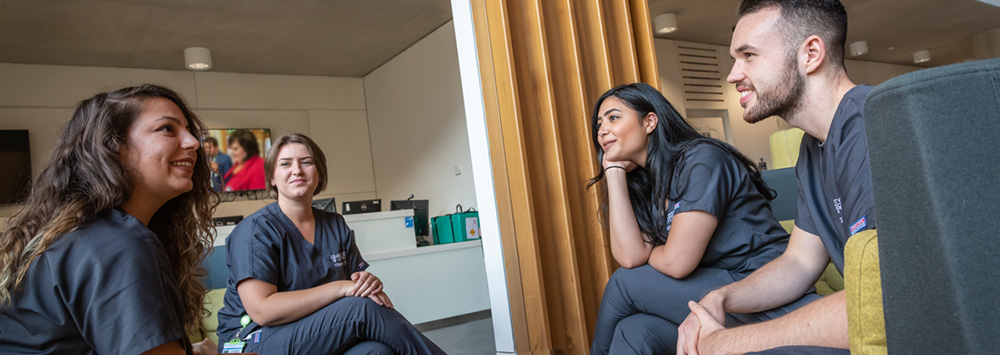Year 1 Overview
Students begin to adapt their communication abilities towards gathering information from patients using a person centred approach.
Academic Lead for Year 1: Mr Chris Huntley
The Year 1 CCP course introduces students to clinical communication in the medical setting. Basic ideas and concepts are introduced here, including an overview of the medical history, issues surrounding informed consent, and the most effective ways of gathering information.
Year 1 CCP consists of four small-group sessions, facilitated by Core CCP Tutors, with a focus on basic consultation skills and gathering information from patients.
Core attributes of CCP
Throughout the CCP curriculum we guide our students towards developing core attributes that research indicates contribute to skilful clinical communication and high quality person-centred care. These attributes are:
- Attentiveness and curiosity
- Adaptability to patient and context
- Professionalism and respect
- Empathy and compassion
Year 2 Overview
Students begin to take histories from patients, while continuing to practice their communication with simulated patients.
Academic Lead for Year 2: Dr Anna Lamond
Many students look forward to their first experiences in the clinical setting, but they can also find hospital a daunting place.
Year 2 CCP aims to bridge the transition between students’ (primarily) university-based experiences in the first two years and their extended hospital experiences in Year 3. We introduce CCP topics that relate directly to the clinical setting and help students integrate core attributes of CCP taught in Year 1 in to clinical history taking.
Year 2 CCP consists of a group of plenaries and 6 small group sessions, facilitated by Core CCP Tutors and focusing on person-centred history taking.
Year 3 Overview
Students develop their history taking in a range of clinical specialties and begin to explore the skills needed to explain complex information and support patients in receiving difficult information and reaching decisions about care.
Academic Lead for Year 3: Dr Isobel Jenkins
In Year 3, students spend the majority of their time on placements in hospitals and GP surgeries, giving them the opportunity to develop their history taking skills and adapt them to a range of clinical specialities.
Practice and observation in the clinical setting are complemented by small group workshops introducing themes such as communicating complex and difficult information, supporting shared decision making, talking about risk and uncertainty and supporting change.
Year 3 CCP workshops are facilitated by Core CCP Tutors from a range of medical backgrounds and give students the opportunity to practice their communication with trained role-players in increasingly complex simulated scenarios.
Year 4 Overview
In this year students experience advanced communication training within their Palliative Care Block.
Academic Lead for Year 4: Mrs Jan Howard
In Year 4 students learn how to communicate difficult information and have conversations about sensitive issues; they also learn how to break bad news and give complex information, alongside guidance on responding to complex clinical situations in an end of life care setting.
Students have the opportunity to reflect on the emotional and psychological impact of life limiting illness, and receive additional training in communication with deaf people and people with learning disabilities and their carers.
Year 5 Overview
In their final year, student doctors review and consolidate previously learned professional communication skills and gain confidence in using them flexibly, responsively and effectively as they prepare for their upcoming role as junior doctors.
Academic Lead for Year 5: Dr Isobel Jenkins
Student doctors attend a workshop which gives them the chance to discuss and practise challenging communication situations with the support of experienced simulated patient role-players, faculty members and Core CCP Tutors from a variety of clinical backgrounds.
Simulated scenarios include themes such as responding to conflict, providing clear information and negotiating management plans, sensitively managing issues around confidentiality and collusion when supporting family members and communication in unexpected situations including talking to relatives after the unexpected death of a loved one.
Working as a Core CCP Tutor is very rewarding. Small-group teaching helps students to gain the confidence they need.
Liverpool CCP Tutor
Back to: School of Medicine
